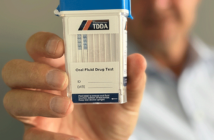A former Young Farmer of the Year stresses the importance of communication when it comes to farm safety
David Kidd grew up on a farm with strong verbal communication around health and safety.
“There were no formal policies back then,” says David, the 2014 Young Farmer of the Year, who now runs Angus breeding cows, beef bulls, trading heifers and steers on two adjacent blocks totalling 555 ha at Kaipara Harbour.
“But the prevailing attitude was ‘Don’t be an idiot.’ Everyone on the farm was told how things should be done safely.
“For instance, if you’re using a quad on a hill, drive it uphill and downhill but never across the side.
“There was a strong culture of calling out unsafe behaviour. I remember one day, I did drive a four wheeler across the side of a hill, and suddenly there were several people running towards me yelling ‘Stop right now’!
“Another time, as a student, I was earning some money chain sawing firewood and the farm manager came by.
“A few minutes later, he came back with chainsaw chaps for me. There was always someone looking out and prepared to say ‘That’s not okay’”.
“There has been a massive cultural shift in my lifetime. Growing up on the farm we didn’t think, for instance, to wear safety glasses during fencing, even though there’s a risk of staples flying out or a wire snapping back.
“That’s a policy here and it’s become automatic. The same goes for the farm motorbikes. A helmet is always left sitting on a bike. So no matter which vehicle you get on, a helmet is always there, there’s no excuse for forgetting.
“Before anyone uses a farm vehicle, they are expected to walk around and check it and let me know if any issues need addressing.
“We have beekeepers and people who ride horses on the farm. It’s an agreed policy that they always text me to let me know when they are coming onto the land and again when they leave and I can plan around that.
Health and safety is an integral part of fortnightly farm meetings.
“We talk about things like near misses. Issues that have come out of that include wheels slipping on a particular track, and getting pushed about on the tractor because the silage wagon was a bit overloaded. We talk about how we can mitigate the hazard and those decisions become farm policy – so if you are going along that track you have to be in low gear, and you never overload the trailer.
“A lot of it’s around stock, like someone saying they had to run for the rails in the cattleyard. So we changed the way we use the yard.
“We put half the mob in, rather than filling to capacity, giving them a bit more space, and we give them time to calm down. If there’s a truck coming in, I make sure there’s always someone here to help with unloading.”
While David minutes the farm meetings, he is committed to putting policies into written form.
“There’s a perception out there that it means a lot of writing but I think the message is starting to get out on the grapevine that it doesn’t have to.
“The last thing any farmer wants is an accident on their farm but, if it does happen, you do need to be able to show you’ve done everything you can to prevent that happening.
KEY POINTS
- Make safe practices the norm on your farm – ‘do’ as you expect your staff to.
- Encourage your workers to raise any health and safety risks they have as they may see more in their daily work than you.
- Communicate with contractors before any work starts on your farm so everybody is aware of any on-farm and contractor-related risks to be aware of.
- Also, establish your respective roles, responsibilities and actions to prevent any gaps in managing health and safety risks.


